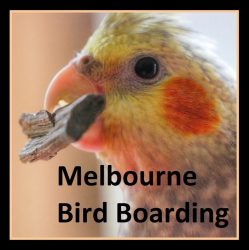Avian experts have determined that 95% of pet bird health issues are dietary in origin.
In addition to pellets , you can offer your bird a variety of foods for a well-balanced and nourishing diet.
Safe & healthy Foods
green beans
peas
bok choy
broccoli
brussel sprouts, cabbage
capsicum
cucumbers
dark green leafy lettuce
carrots
squash
zuchinni
kale
pumpkin
sweet potato
sprouts
Good sources of protein, give 2-3 times a week:
cooked chicken, fish & lean meats – including the bones
cooked chicken eggs
cottage cheese & yogurt
cooked lentils and beans
nuts
Give in moderation:
corn
spinach
asparagus
celery
Herbs you can give:
coriander, basil, dandelions, dill, fennel, oregano, parsley, rosemary, thyme, grass seeds and common garden weeds
Treats Include:
cooked pasta & rice
wholemeal toast
nuts, dried fruit
low sugar cereals – all bran, weet bix, etc.
unsalted popcorn, crackers & pretzels
millet or seed mix with the sunflower seeds mostly removed
Fruit should be given in smaller amounts due to the sugar content.
Vegies are best! Many parrots such as Cockatoos, Cockatiels and Budgies will not be interested in fruit, except to destroy it, like my tiels do to apple, none of it gets eaten, they just like the crunch!
Toxic & Unhealthy Foods
Avocado – large doses may cause cardiac distress, breathing problems, disordered plumage and weakness. The leaves, skin and pit appear to be the most toxic. In one study, Budgerigars fed 1.0g of avocado fruit (10% of their body weight) developed agitation and feather pulling, while 9.0g of avocado fruit (25% of their bodyweight) resulted in death, so it seems a decent amount of avocado flesh would need to be accidentally consumed before it causes harm.
Chocolate- consuming large amounts of chocolate, especially dark chocolate, can cause death in all animals (including humans). Dark chocolate has much more theobromine compared to milk chocolate. White chocolate contains no theobromine. The reports of chocolate toxicity in captive birds are sketchy. It has been suggested that birds are less likely to eat toxic amounts of chocolate, but that they may be more sensitive to its effects, as all previously reported clinical cases have resulted in death of the bird. Milk chocolate contains 2mg of theobromine per 1g. 1 square of Cadbury milk chocolate weighs 6.2g, therefore 1 square contains around 12mg theobromine. If the lethal dose is the same as a dog at 200mg/kg (20mg per 100g) then your 100g bird (quaker, cockatiel, lori) would be in danger if it ate 2 squares of milk chocolate. ***Dark chocolate (65% Cocoa) contains 10mg of theobromine per 1 gram, so is 5 times more toxic than milk chocolate.
Tomato & Eggplant leaves, vines, stems- remove all green parts due to the higher concentration of alkaloids present which may cause problems, although the evidence of harm is weak.
Caffeinated drinks- large amounts may cause cardiac malfunction, arrhythmia, hyperactivity and cardiac arrest.
Alcoholic beverages- alcohol in large amounts can cause alcohol poisoning.
Pits or seeds- of fruits such as apples, cherries, pears, peaches and apricots. The seeds contain trace amounts of cyanide, so are harmless. Just don’t go collecting the seeds and feeding huge amounts to your bird!
Rhubarb- once cooked, is no longer toxic. Uncooked Rhubarb is also toxic to humans.
High-fat, fried, salty or high-sugar foods- if given regularly, these foods can cause multiple health problems in birds. Salty or high-sugar foods cause such problems as dehydration, excessive thirst, kidney dysfunction and death. High fat in the bird’s diet leads to obesity and may result in lipomas (fatty tumors), lipemia (fat in the blood), and hepatic lipidosis (fatty liver disease).
Mushrooms- large amounts may cause digestive problems in some birds.

